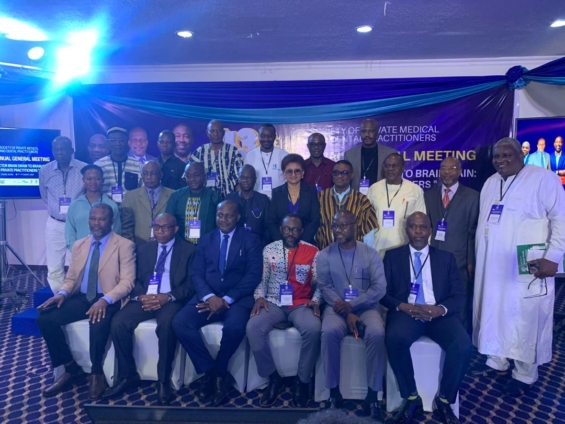The President of the Society of Private Medical and Dental Practitioners (SPMDP), Dr. Andre Kwasi-Kumah, has called on the government to implement business-friendly policies to help curb the brain drain affecting Ghana’s health sector.
Dr. Kwasi-Kumah highlighted the significant influence of global economic forces on the movement of health workers and stressed the need for strategic investments in domestic healthcare.
He, therefore, believes that the implementation of strategic and proactive policies will curb the brain drain that is gradually becoming a threat to the nation’s health sector.
“Investing in and strengthening domestic healthcare, providing career opportunities and attractive remuneration, and investing in research and development within a context of political stability are necessary ingredients to attract and retain health workers,” he said.

Dr Kwasi-Kumah made this clarion call when delivering a speech on Friday at the 43rd Annual General Meeting (AGM) of the SPMDP.
While acknowledging that the government bears the primary responsibility for retaining health workers, he noted that the private health sector also plays a crucial role.
The SPMDP President proposed a two-pronged approach to address brain drain: training and retaining healthcare workers.
He noted that private medical schools and nursing training institutions are already producing graduates to complement those from public institutions, he therefore urged the government to alleviate the financial burdens of these private institutions by seconding lecturers and subsidising the cost of training equipment.

Additionally, he suggested that the scholarship secretariat sponsor Ghanaian students at local private institutions to reduce the need for international training, which often requires retraining upon their return.
For retention, Dr. Kwasi-Kumah called for the government to introduce business-friendly policies, such as import waivers on medical equipment, lower taxes, special utility rates, and human resource support.
“This will enhance expansion and enable the sector to retain healthcare workers as well as reaching out more to the districts and sub-districts. The savings thereby made will ultimately be passed on to our clients,” he explained.

Dr. Kwasi-Kumah also highlighted the importance of empowering the local health workforce through technology and innovation.
He noted that the availability of such technologies could encourage trainees to stay in Ghana rather than seeking to practice abroad.
“The increased application of new, innovative, and advanced technology in our country will have the added advantage of making Ghana an increasingly recognized destination for medical tourism, with a resultant inflow of foreign exchange that will help strengthen our cedi,” he opined.
Dr. Kwasi-Kumah subsequently pledged that the Society would contribute its quota and be reliable partner to the government in achieving shared health goals and reducing the disease burden among Ghanaians.
“The SPMDP is determined to be a very engaged and active player in the private sector in a way to help reduce the disease burden of our people. This we believe we can achieve when we set our minds to it and get to work,” he noted.
Latest Stories
-
Mahama pledges 70% world market cocoa price to farmers
59 minutes -
EOCO teams up with Nigerian agency to rescue trafficking victims
59 minutes -
State funeral to be held for Joseph Kobina Ade Coker on August 1
1 hour -
Mahama orders arrest of fake anti-galamsey taskforce extorting miners
2 hours -
Joseph Kobina Ade Shino Coker
2 hours -
Royal Sweet Limited signs up for JoySports Invitational Tournament 2025
2 hours -
Ghanaian movie industry wasting talent – Gloria Sarfo
2 hours -
Ho West MP secures 100 international scholarships for constituents
3 hours -
Bank of America’s Bernard Mensah discusses AI, jobs and global economic pressures
3 hours -
President Mahama announces plans to build six modern sports stadia
3 hours -
Expert wants gov’t to extend NSS allowance beyond service period
3 hours -
Western North: Mahama pledges action over ‘empty slogans’
3 hours -
Ghanaian AI startup Fornix Labs pilots tool to support workload of doctors
3 hours -
CCTV captures woman allegedly stealing baby at Ajumako market
3 hours -
WAFU B Boys Cup: Black Satellites take on Benin U-20 in second group game
4 hours

